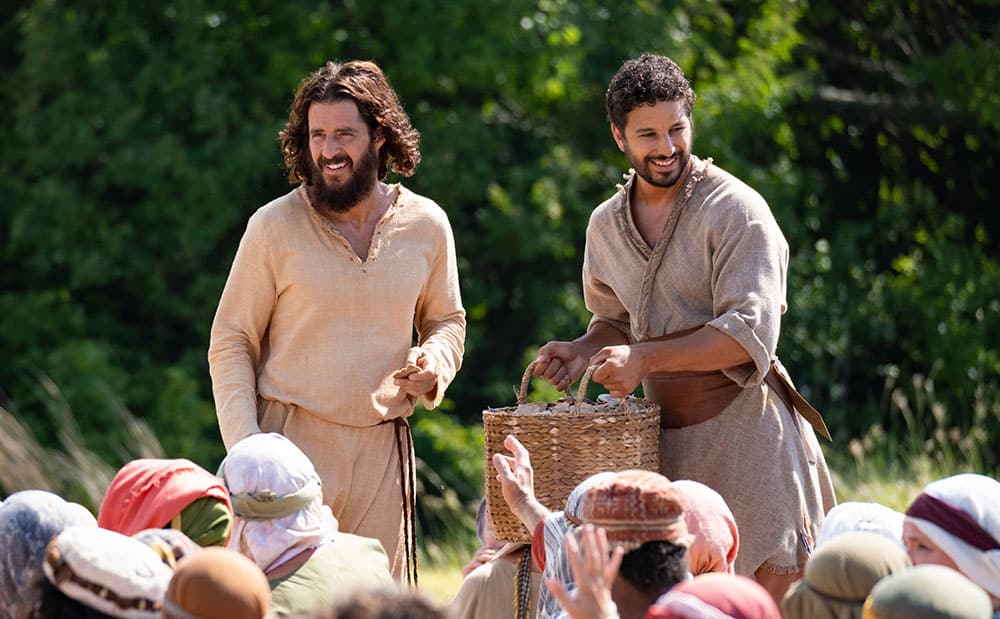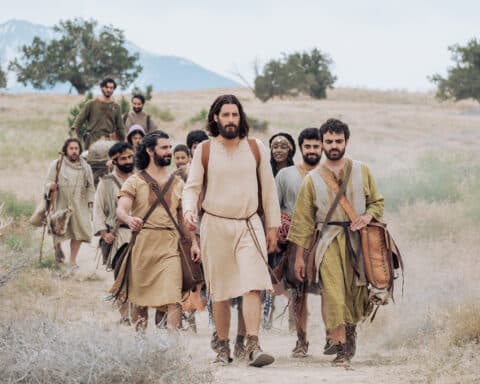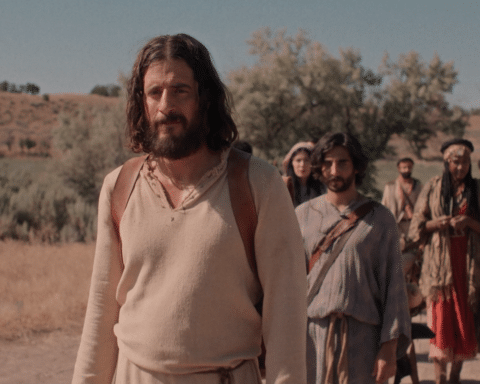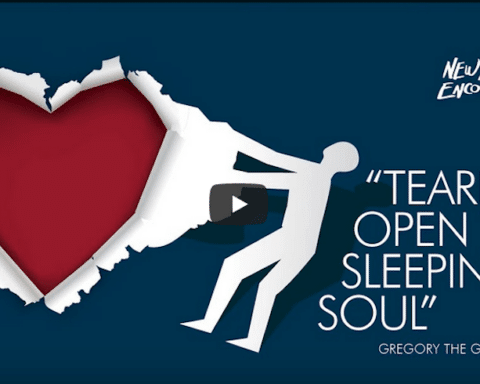Early in the hit series “The Chosen,” an entire episode is devoted to Jesus befriending and teaching a small band of young children. I felt like I was watching Jesus hone the craft of his teaching with his first students, who were open to and accepting of him, who listened to and appreciated him, who clearly grew to love him. It was like an extended, imaginative commentary on two verses of Matthew’s Gospel: “Amen, I say to you, unless you turn and become like children, you will not enter the kingdom of heaven. Whoever humbles himself like this child is the greatest in the kingdom of heaven” (18:3-4). We might imagine Jesus’ later teaching arising from a memory of his first school, preceding his public ministry, when these children came to him.
I was edified by this episode, and we started watching “The Chosen” as a family.
The struggle of creation
In the year before watching “The Chosen,” I had spent nine months engaging in the Spiritual Exercises of St. Ignatius, with the guidance of a spiritual director. Much of the work of the Spiritual Exercises concerns constructing and imagining the mysteries of salvation, from one Gospel scene to another. It is hard work. Every day, for nine months, I experienced highs and lows in this prayer regimen, with days of ease where the scenes would be vivid and other days of trial where everything was hard. Regardless of the day, I always wrote one page in a journal (never more, never less) based on my time in prayer. When I later looked back at those pages, some days of trial inexplicably contained the greatest insights.
What had been created in prayer was not simply a vision but also (in a way that is difficult to explain) a way of understanding, remembering and willing each particular mystery in my own mind and heart. Even months removed from the days of dwelling with a given mystery in prayer, I could still see and feel it when I went back to read the journal pages from those days, or simply by recollecting the event. That was true of all the mysteries until I watched “The Chosen’s” portrayal of one of those same events: the wedding at Cana.
I noticed that the superb televisual imagery of the wedding at Cana was pushing away the images I had so painstakingly created in prayer for that mystery. And with those images went whatever the struggle to create them did to me. I stopped watching “The Chosen” right then and there.
I didn’t stop because I think the show is bad; to the contrary, I think it is very good. I didn’t stop because I think it is unfaithful to the Gospel; from what I saw, it is quite faithful even when it goes beyond the letter of the text. And I didn’t stop because I judged the show to lack insight or imagination; indeed, I think the fruit of genuine contemplation is presented throughout.
I stopped watching “The Chosen” because I suddenly realized, in a deep and visceral way, that television was robbing me of what the hard work of imaginatively constructing biblical scenes in prayer affords me. The problem was not the content or the quality of the production, but the very medium itself.
The medium of television
Television creates an environment that is apathetic to your own environment. What is presented on the screen is what there is, with no possibility of exchange. It gives the appearance of a total experience: All that is to be seen and heard is prepared beforehand, ready-made for us as viewers. The boundaries of what we can perceive and think about are, by and large, determined for us without our consultation. Part of the enjoyment of consuming television is this degree of ease. There is indeed thought-provoking television, but the fact remains that the environment is projected to you. You have no part in its construction.
If we are only or primarily interested in the Gospel because of its message, then this is not much of a problem. So long as the message is communicated, it matters comparatively little how it is communicated. But if the Gospel is about more than mere message — if, instead, it is primarily about an encounter — then the manner of communication matters quite a bit.
I had conceptual knowledge of this idea before, but it wasn’t until I experienced the conflict between the Spiritual Exercises and “The Chosen” during the wedding at Cana that I understood this in a profound and personal way. The Spiritual Exercises (along with other forms of prayerful contemplation of Scripture) demand that I work, that I am willing to be engaged, that I allow my mind and heart to be the raw material that the word of God orders and forms into scenes and sense experiences. Ignatius leads exercitants toward this with the application of the senses, where you strive to see, hear, smell, taste and touch each scene in your imagination. I am the space of encounter. When the work was done for me by television, I enjoyed what I perceived by sight and sound, but I was missing the strange and unforgettable joy of having to struggle for what I experienced.
Removing the cost of encounter
The technology and culture commentator Nicholas Carr makes an argument that I think applies here. In regard to the rise of GPS technology that enables us to arrive at destinations efficiently but takes away the need for us to learn how to read our surrounding environment well or learn things by heart, he asks: “Who cares? As long as we arrive at our destination, does it really matter whether we maintain our navigational sense or offload it to a machine?” He answers his own question: Yes, it does. “We are, after all, creatures of the earth. We’re not abstract dots proceeding along thin blue lines on computer screens. We’re real beings in real bodies in real places. Getting to know a place takes effort, but it ends in fulfillment and in knowledge. It provides a sense of personal accomplishment and autonomy, and it also provides a sense of belonging, a feeling of being at home in a place rather than passing through it” (“The Glass Cage,” W.W. Norton, $16.95).
I believe the Gospel is more a world to inhabit than just a message to receive. It matters very much that we find our home there, with and around Jesus. We must learn how to navigate that world. We do not learn how to navigate so well if it has been navigated for us in advance. Even more, that world of the Gospel is to shape the space of our minds and hearts rather than being filtered through a machine that shows it to us. It is a matter of the kind of people the Gospel makes of us.
Jesus does not beam himself to us; he beckons us to encounter him, and encountering is hard work. We have to be there, where he is, with him, attuned and attentive. We have to open the space in ourselves for him to draw near. There are a lot of frustrations and failures on the journey to that encounter — a lot of seemingly fruitless days of prayer — but none of the work is wasted. By that work we become the kind of people who can encounter him more fully, through and with the power of our own minds, hearts and imaginations.
I am staying away from “The Chosen” because I know what the televisual portrayal of the mysteries of salvation will do to me … or rather, what they will do for me. I don’t want my children to watch because I want them to have to experience the struggle and the joy of encountering the Gospel themselves. I know that means that I must take up my responsibility to show them how to encounter the Lord in Scripture.
Seeing and seeing again
I recently started doing the Spiritual Exercises a second time. My encounter with the Gospel mysteries is not the same as it was the first time. Sometimes I have to work hard to allow a new insight or scene to emerge. Sometimes what I imagine is not as vivid or elucidating as my first experience, yet sometimes where there was a frustrating trial before I find delightful success now. Several times I have dwelt in the same scene I previously constructed, but from a new angle or perspective, which makes the whole experience fresh and familiar at the same time.
What I have found throughout is that even when a new experience of a Gospel scene emerges, it does not force out the old one. I retain not only the sensory experiences but also the memory and feeling of the struggle to build them. I don’t understand myself well enough to know why this happens, why this later experience of, say, the wedding at Cana does not drive out the previous one when both experiences have come through the work of imaginative prayer. All I know is that they seem to harmonize and respect each other in a way that the televisual projection I consumed did not.
I am coming to see that the struggle of engagement is necessary for me to ever more genuinely encounter the Gospel of Jesus Christ. Indeed, the struggle is crucial to the Gospel encountering me.
Leonard J. DeLorenzo, Ph.D., is a faculty member of the McGrath Institute for Church Life and teaches theology at the University of Notre Dame. You may subscribe to his weekly newsletter, “Life, Sweetness, Hope,” at bit.ly/lifesweetnesshope.





